HCC Network's Project Connect Event
- Need: To expand public health and human services to adults living in rural West Central Missouri.
- Intervention: HCC Network organizes Project Connect events, daylong resource fairs that offer free public health and human services to low-income adults.
- Results: In 2023, Project Connect events welcomed 140 guests and offered numerous services and resource connections.
Description
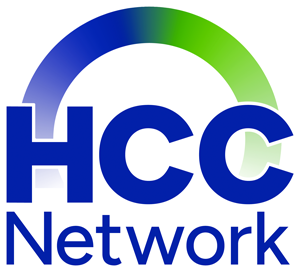 HCC Network is a rural healthcare network comprised
of over 60 organizations that serve Missouri's Lafayette,
Carroll, Ray, Saline, and Eastern Jackson counties. HCC
Network provides a centralized service hub to ensure
adequate provision of healthcare services to the public.
It also serves as a source of advocacy for healthcare
providers. Read more about HCC Network in RHIhub's
Rural Monitor article
Rural Network Leads the Way with Intentional
Collaboration.
HCC Network is a rural healthcare network comprised
of over 60 organizations that serve Missouri's Lafayette,
Carroll, Ray, Saline, and Eastern Jackson counties. HCC
Network provides a centralized service hub to ensure
adequate provision of healthcare services to the public.
It also serves as a source of advocacy for healthcare
providers. Read more about HCC Network in RHIhub's
Rural Monitor article
Rural Network Leads the Way with Intentional
Collaboration.
Along with their many other programs, HCC Network has organized Project Connect events since 2015 to promote access to community services. Based on Missouri's Project Homeless Connect Workgroup model, Project Connect brings service organizations together to provide free public health and human services for one day to low-income adults and their families.
Project Connect's vision is to provide care for the whole person, not just their ailment. Volunteer guides accompany guests through the vendor booths, which include medical services, county public health offices, recovery resources, veterans' services, and much more.
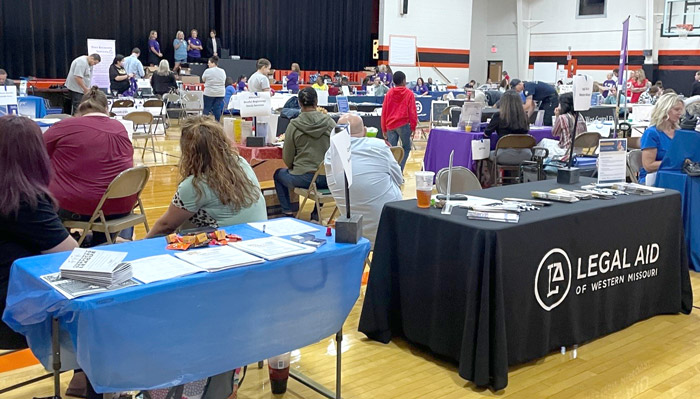
Throughout the year, manufacturers and retailers donate goods such as bedding, towels, paper products, toiletries, mattresses, and mobility equipment to The Warehouse, another HCC Network program. While The Warehouse benefits organizations that serve those in need throughout the year, items are also distributed to attendees of Project Connect events.
HCC Network works with 60 local service providers, businesses, schools, civic groups, churches, and individuals, including the Missouri Department of Social Services Family Support Division, to extend invitations to clients who could benefit from this event.
Project funders include the REACH Healthcare Foundation of Greater Kansas City, HCC Network, Lexington 4-Life Center, and other private organizations.
Services offered
Project Connect events have typically been held at school gymnasiums or churches. Project Connect events offer the following services, which are often difficult to access for patients with low income or other disadvantageous social determinants of health.
Public Health Services
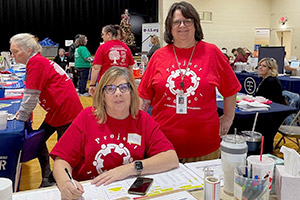
- Free medical services from local clinics, including appointment scheduling
- Vouchers for immunizations
- Nursing and in-home care resources
- Dental extractions
- Measurements for glucose, A1C, blood pressure
- Pregnancy tests, women's resources
- Prescription drug disposal
- Distribution of donated goods including bedding, towels, paper products, toiletries, mattresses, and mobility equipment
Human Services
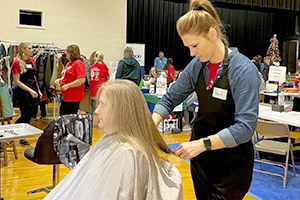
- Nutritional education and program enrollment
- Job services
- Housing information and utility assistance
- Enrollment for Medicaid, food stamps, unemployment, disability, etc.
- Veterans' resources and services
- Recovery resources
- Referrals to social service providers
- Vouchers for birth/death certificates, driver's licenses, photo IDs
- Hair cuts
- Care packages
Results
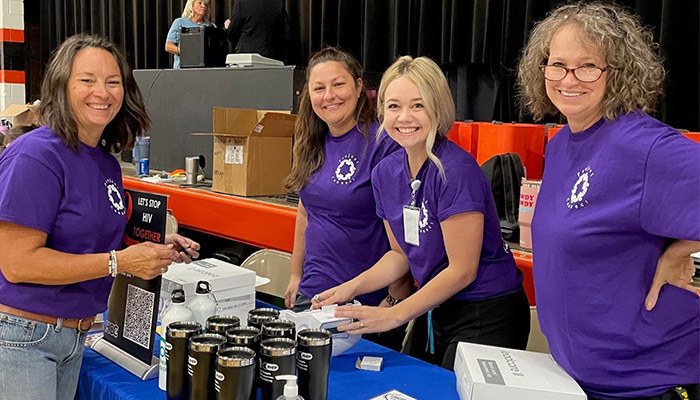
The following are results from two Project Connect events
in Oak Grove and Wellington in 2023:
- 228 volunteers
- 140 total guests
- Over 150 care bags distributed
- Over 250 meals served
- 20 teeth extracted
- 35 haircuts provided
Read about results from other Project Connect events.
The Warehouse and Project Connect are featured in the following news articles:
Challenges
Getting community members, service groups, and volunteers to grasp the fact that there are people in their own communities who are in need was initially a challenge. However, once people witnessed the needs first-hand at Project Connect events, the reality became clearer.
Another early challenge was finding a way to collect the items businesses and individuals wished to donate. In 2018, HCC Network purchased a box truck, which solved the transportation problem.
Replication
Project Connect organizers offer the following tips for anyone interested in replicating their model:
- While having at least one champion of this event is key, it is essential to also have buy-in from community members to make this event a success. Establish local leadership teams to give direction and provide input about their communities' needs.
- Hold weekly meetings with stakeholders to keep momentum going, secure volunteers, and keep up to date with vendor needs.
- Maintaining good relationships and open communication with your stakeholders is valuable for funding purposes as well. Make sure to communicate all the services you offer through the event. The wider the range of services, the more likely your potential funders will find at least one that interests them.
- Share your vision widely through the network and organizations with whom you partner, since their clients should be your target audience. Communicate passionately to make clear that this event is necessary and beneficial.
- Start marketing for volunteers early. Depending on the size of event, anywhere from 100 to 200 volunteers may be needed. Leverage social media, local media, and schools to get the word out about volunteer needs and event details.
- HCC Network staff follow up with all Project Connect attendees using the PRAPARE Assessment Tool, a comprehensive resource directory, to ensure all the clients' needs have been met.
Contact Information
Melissa Smith, Director of Population HealthHCC Network
Project Connect
816.634.3347
melissa.smith@hccnetwork.org
Topics
Human services
· Networking and collaboration
· Public health
States served
Missouri
Date added
January 12, 2018
Date updated or reviewed
June 21, 2024
Suggested citation: Rural Health Information Hub, 2024. HCC Network's Project Connect Event [online]. Rural Health Information Hub. Available at: https://www.ruralhealthinfo.org/project-examples/1001 [Accessed 21 April 2025]
Please contact the models and innovations contact directly for the most complete and current information about this program. Summaries of models and innovations are provided by RHIhub for your convenience. The programs described are not endorsed by RHIhub or by the Federal Office of Rural Health Policy. Each rural community should consider whether a particular project or approach is a good match for their community’s needs and capacity. While it is sometimes possible to adapt program components to match your resources, keep in mind that changes to the program design may impact results.
